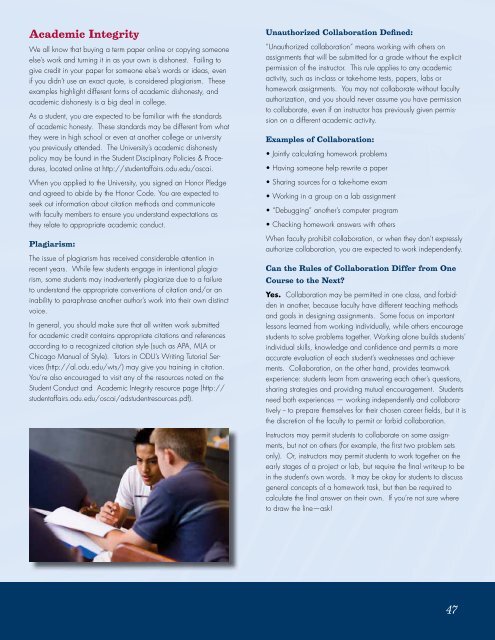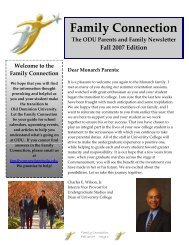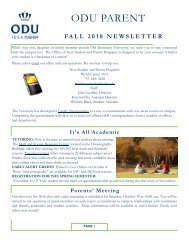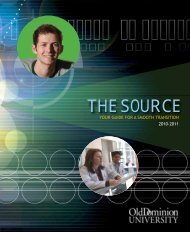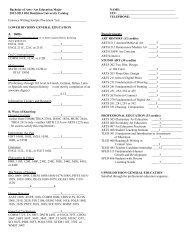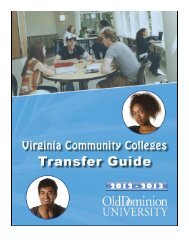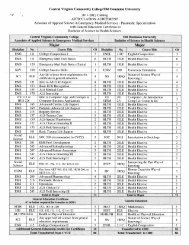Untitled - Academic Enhancement - Old Dominion University
Untitled - Academic Enhancement - Old Dominion University
Untitled - Academic Enhancement - Old Dominion University
You also want an ePaper? Increase the reach of your titles
YUMPU automatically turns print PDFs into web optimized ePapers that Google loves.
<strong>Academic</strong> IntegrityWe all know that buying a term paper online or copying someoneelse’s work and turning it in as your own is dishonest. Failing togive credit in your paper for someone else’s words or ideas, evenif you didn’t use an exact quote, is considered plagiarism. Theseexamples highlight different forms of academic dishonesty, andacademic dishonesty is a big deal in college.As a student, you are expected to be familiar with the standardsof academic honesty. These standards may be different from whatthey were in high school or even at another college or universityyou previously attended. The <strong>University</strong>’s academic dishonestypolicy may be found in the Student Disciplinary Policies & Procedures,located online at http://studentaffairs.odu.edu/oscai.When you applied to the <strong>University</strong>, you signed an Honor Pledgeand agreed to abide by the Honor Code. You are expected toseek out information about citation methods and communicatewith faculty members to ensure you understand expectations asthey relate to appropriate academic conduct.Plagiarism:The issue of plagiarism has received considerable attention inrecent years. While few students engage in intentional plagiarism,some students may inadvertently plagiarize due to a failureto understand the appropriate conventions of citation and/or aninability to paraphrase another author’s work into their own distinctvoice.In general, you should make sure that all written work submittedfor academic credit contains appropriate citations and referencesaccording to a recognized citation style (such as APA, MLA orChicago Manual of Style). Tutors in ODU’s Writing Tutorial Services(http://al.odu.edu/wts/) may give you training in citation.You’re also encouraged to visit any of the resources noted on theStudent Conduct and <strong>Academic</strong> Integrity resource page (http://studentaffairs.odu.edu/oscai/adstudentresources.pdf).Unauthorized Collaboration Defined:“Unauthorized collaboration” means working with others onassignments that will be submitted for a grade without the explicitpermission of the instructor. This rule applies to any academicactivity, such as in-class or take-home tests, papers, labs orhomework assignments. You may not collaborate without facultyauthorization, and you should never assume you have permissionto collaborate, even if an instructor has previously given permissionon a different academic activity.Examples of Collaboration:• Jointly calculating homework problems• Having someone help rewrite a paper• Sharing sources for a take-home exam• Working in a group on a lab assignment• “Debugging” another’s computer program• Checking homework answers with othersWhen faculty prohibit collaboration, or when they don’t expresslyauthorize collaboration, you are expected to work independently.Can the Rules of Collaboration Differ from OneCourse to the Next?Yes. Collaboration may be permitted in one class, and forbiddenin another, because faculty have different teaching methodsand goals in designing assignments. Some focus on importantlessons learned from working individually, while others encouragestudents to solve problems together. Working alone builds students’individual skills, knowledge and confi dence and permits a moreaccurate evaluation of each student’s weaknesses and achievements.Collaboration, on the other hand, provides teamworkexperience: students learn from answering each other’s questions,sharing strategies and providing mutual encouragement. Studentsneed both experiences — working independently and collaboratively-- to prepare themselves for their chosen career fi elds, but it isthe discretion of the faculty to permit or forbid collaboration.Instructors may permit students to collaborate on some assignments,but not on others (for example, the fi rst two problem setsonly). Or, instructors may permit students to work together on theearly stages of a project or lab, but require the fi nal write-up to bein the student’s own words. It may be okay for students to discussgeneral concepts of a homework task, but then be required tocalculate the fi nal answer on their own. If you’re not sure whereto draw the line—ask!47


